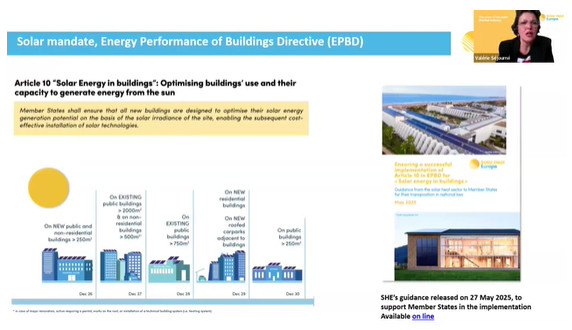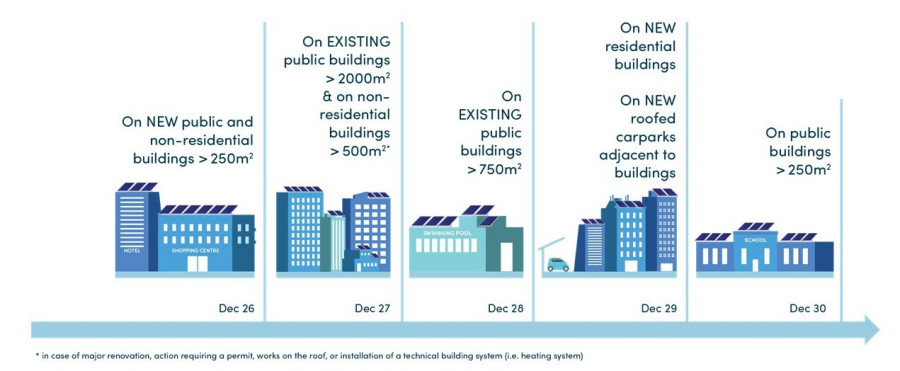Posted: July 24, 2025

In today’s fast-changing European policy landscape, effective advocacy is more crucial than ever - both at EU and at national level. The EU is pushing forward with ambitious climate goals through initiatives like the Green Deal and the Fit for 55 package, which are currently being implemented across member states. As Valérie Séjourné, Managing Director of Solar Heat Europe, highlighted in a recent presentation at the IEA SHC Solar Academy webinar, this creates a favorable legislative environment for solar thermal energy. However, the speed and complexity of policy developments can make it challenging for sectors like solar thermal to stay on track. In her presentation, Séjourné outlined the key political initiatives coming from Brussels. You can access the recording of the webinar and download the presentations here: : https://www.iea-shc.org/solar-academy/webinar/solar-heat-worldwide-2025
"While we commend the EU's efforts with the Green Deal and the Fit for 55 package, we now urge the 27 Member States to implement these laws effectively", said SHE Managing Director Valérie Séjourné. "Solar thermal can play a key role in meeting the 55 % global greenhouse gas emissions reduction target by 2030", she added in a statement published in late June commenting on Solar Heat Worldwide. Link to: https://solarthermalworld.org/news/solar-heat-faces-setbacks-in-buildings-but-industrial-use-and-district-heating-expand/. https://solarheateurope.eu/2025/06/24/solar-thermal-industrial-actors-call-for-clear-political-support-for-their-no-regret-technologies-across-regions/
Renewable heat and solar heat technologies struggling to keep up the momentum
The report from the IEA SHC Programme revealed that several of the key solar thermal markets in Europe declined in 2024 such as Germany (-42 %), Poland (-43 %), Spain (-30 %), Italy (-36 %) and Greece (-26 %). Among the key European markets only Cyprus saw a small amount of growth of 2 % in 2024 and Austria’s solar thermal market stagnated after several years of decline.
“The momentum which we saw in 2022 following Russia’s aggression in Ukraine leading to 12 % growth in Europe was not maintained and we have seen declining markets in 2023 and 2024”, commented Séjourné. In the most recent IEA SHC Solar Academy webinar she listed a number of reasons for this lower than expected pace:
- Lower investments due to higher interest rates
- Unstable policy signals at national level regarding the exit from fossil fuels
- Stop and go market effects in some countries due to inconsistent public policies and subsidies
- Reduction in gas prices and carbon prices under the Emissions Trading System (ETS) for industry
- Intense competition among heating and cooling technologies, especially with heat pumps gaining more visibility
- The practice of dumping solar PV panels from Asia at extremely low prices is intensifying competition in the rooftop space
Solar Heat Europe navigates policy complexity
The EU’s recent push for the Clean Industrial Deal and the Heating and Cooling Strategy can create a positive legislative framework for solar heat. Solar Heat Europe is actively engaging to ensure solar thermal’s place in the transition.
The Clean Industrial Deal aims at accelerating the decarbonization of Europe’s industrial sectors by promoting clean technologies, circular economy practices, green hydrogen and the use of renewable energy, while ensuring the EU remains globally competitive. As part of this deal the European Commission will launch a EUR 100 billion Industrial Decarbonization Bank in 2026. Ahead of this launch, a pilot auction will be offered to industrial players by the end of 2025. The Commission recently published the draft Terms and Conditions for this first auction, and is collecting feedback (link to https://solarheateurope.eu/2025/07/14/elementor-25285/) on the draft until 15 August 2025. Solar Heat Europe is currently finalizing its input and stresses the fact that 90 % of the European demand comes from the EU.
In relation to the industry's competitiveness, another key area of focus for Solar Heat Europe is the Net Zero Industry Act. This legislation seeks to firmly establish clean-tech sectors within the EU in order to increase the EU’s independence and energy security further. Various enquiries on the production capacity of Solar Heat Europe members and conditions to promote EU-made technologies are being addressed by the SHE team. It works closely with its members to gather the relevant input and ensure effective contributions.
Another valuable service from Solar Heat Europe: The association has developed a guide to assist EU Member States with implementing Article 10, 'Solar Energy in Buildings,' under the European Performance of Buildings Directive (EPBD). You can access the recorded webinar on this topic from 3 June 2025, here: Solar Heat Europe Resource Center.
The following infographic outlines the timeline and types of building impacted by the EPBD regulations. Member States are required to ensure that certain new buildings are designed to maximize their solar energy generation potential based on the site’s solar irradiance. This will enable the cost-effective installation of solar technologies in the future.

Guide to support EU Member States with the implementation of Article 10 of the EPBD
Source: https://solarheateurope.eu/resource-center/library/#gallery-1
In conclusion, the Heating and Cooling Strategy is another crucial initiative currently under development in Brussels. This strategy will replace the previous version from 2016 and aims to provide greater visibility to the heating and cooling needs across the EU. It is anticipated that the strategy will place significant emphasis on direct renewable heat technologies, particularly geothermal and solar thermal, and set ambitious targets to accelerate the deployment of projects at the local level. The strategy is expected to be launched in the first quarter of 2026. Solar Heat Europe and its members will play an active role in shaping this work and in the consultations expected for the second half of 2025.
Websites of organizations mentioned in this news article: